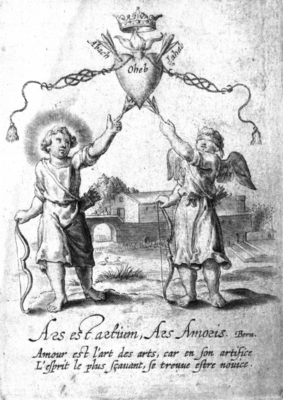Ludovicus van Leuven, Amoris divini et humani antipathia (1629)
Table of contents ↑Natura Amoris [1]

I.
Berna. & de dig. Amor.
ARs est artium, ars amoris; cuius magisterium
ipsa sibi retinuit natura, & Deus auctor natu-
ræ: ipse enim Amor à creatore inditus (nisi natu-
ralis eius ingenuitas, adulterinis aliquibus affe-
ctibus præpedita fuerit) ipse inquam se docet, sed
docibiles sui, docibiles Dei: sed postquā legē Dei
amisit ab homine est docēdus. nō est autem docē-
dus vt sit tanquam qui non sit; sed vt purgetur, &
quomodo purgetur; vt proficiat, & quomodo
proficiat; vt solidetur, & quomodo solidetur do-
cendus est.
ARs est artium, ars amoris; cuius magisterium
ipsa sibi retinuit natura, & Deus auctor natu-
ræ: ipse enim Amor à creatore inditus (nisi natu-
ralis eius ingenuitas, adulterinis aliquibus affe-
ctibus præpedita fuerit) ipse inquam se docet, sed
docibiles sui, docibiles Dei: sed postquā legē Dei
amisit ab homine est docēdus. nō est autem docē-
dus vt sit tanquam qui non sit; sed vt purgetur, &
quomodo purgetur; vt proficiat, & quomodo
proficiat; vt solidetur, & quomodo solidetur do-
cendus est.

Definitio Amoris.
Aug. lib. de anim.
Francis Petrar. de grat. Amor.
Amor est animæ rationalis affectus, per quem
ipsa aliquid cum desiderio quærit & appetit ad
fruendum; per quem & fruitur eo, & cum qua-
dam suauitate interiori amplectitur & conseruat
adeptum.
Amor latens est ignis; gratum vulnus; dulcis
amaritudo; delectabilis morbus; sapidum vene-
num; iucundum supplicium; blanda mors.
Amor est animæ rationalis affectus, per quem
ipsa aliquid cum desiderio quærit & appetit ad
fruendum; per quem & fruitur eo, & cum qua-
dam suauitate interiori amplectitur & conseruat
adeptum.
Amor latens est ignis; gratum vulnus; dulcis
amaritudo; delectabilis morbus; sapidum vene-
num; iucundum supplicium; blanda mors.

Nature de l'Amour.
I.
Puis que l'Amour est Dieu & cause de soy mesme,
Lecteur, tu ne le peux diffinir, si tu n'ayme,
Et resens ce qu' Amour opere dās les cœurs,
En voicy neantmoins toute la conoissance,
Qu' enseignent les effects de son abstruse essance
En ces tableaux diuers formez de ses langeurs.
I.
Puis que l'Amour est Dieu & cause de soy mesme,
Lecteur, tu ne le peux diffinir, si tu n'ayme,
Et resens ce qu' Amour opere dās les cœurs,
En voicy neantmoins toute la conoissance,
Qu' enseignent les effects de son abstruse essance
En ces tableaux diuers formez de ses langeurs.
Translations
 |
The nature of love. |
 |
Division of love Love is divided into God's love (or divine love) and into love of the world or the love of mankind. |
 |
Into the love of friendship and into the love of desire. |
Sources and parallels
-
Same copperplate, slightly altered, in: De liefde is onbegrypelyk [4]
 (in: Willem den Elger, Zinne-beelden der liefde (1703)
(in: Willem den Elger, Zinne-beelden der liefde (1703) )
[Compare
)
[Compare ]
]
References, across this site, to this page:
- De liefde is onbegrypelyk [4]
 (in: Willem den Elger, Zinne-beelden der liefde (1703)
(in: Willem den Elger, Zinne-beelden der liefde (1703) )
)

